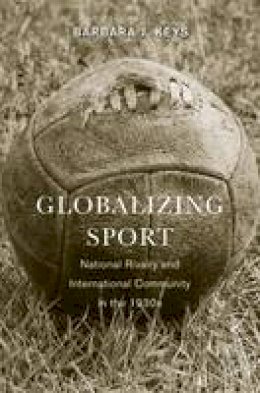
Stock image for illustration purposes only - book cover, edition or condition may vary.
Globalizing Sport: National Rivalry and International Community in the 1930s
Barbara J. Keys
€ 46.01
FREE Delivery in Ireland
Description for Globalizing Sport: National Rivalry and International Community in the 1930s
Paperback. A study of the political and cultural ramifications of international sports competitions in the decades before World War II. Focusing on the United States, Nazi Germany, and the Soviet Union, it examines the transformation of events like the Olympic Games and the World Cup. Series: Harvard Historical Studies. Num Pages: 288 pages, Illustrations. BIC Classification: 3JJG; HBTB; JPS; WSB. Category: (G) General (US: Trade). Dimension: 236 x 155 x 20. Weight in Grams: 340.
In this impressive book, Barbara Keys offers the first major study of the political and cultural ramifications of international sports competitions in the decades before World War II. Focusing on the United States, Nazi Germany, and the Soviet Union, she examines the transformation of events like the Olympic Games and the World Cup from relatively small-scale events to the expensive, political, globally popular extravaganzas familiar to us today.
In this impressive book, Barbara Keys offers the first major study of the political and cultural ramifications of international sports competitions in the decades before World War II. Focusing on the United States, Nazi Germany, and the Soviet Union, she examines the transformation of events like the Olympic Games and the World Cup from relatively small-scale events to the expensive, political, globally popular extravaganzas familiar to us today.
Product Details
Publisher
Harvard University Press
Number of pages
288
Format
Paperback
Publication date
2013
Series
Harvard Historical Studies
Condition
New
Weight
339g
Number of Pages
288
Place of Publication
Cambridge, Mass, United States
ISBN
9780674725706
SKU
V9780674725706
Shipping Time
Usually ships in 7 to 11 working days
Ref
99-1
About Barbara J. Keys
Barbara J. Keys is Associate Professor of U.S. and International History at the University of Melbourne.
Reviews for Globalizing Sport: National Rivalry and International Community in the 1930s
Keys notes that the growth of international sport occured despite the depression, ideological conflicts, and chauvinism. Sport grew in that seemingly hostile setting through its mass appeal and ability to consolidate group identity at local and national levels, and by providing a means to mediate between national and international identities, which involved acceptance and adoption of such values as competition, hierarchy, high achievement, individualism, and universalism....Keys presents a smartly argued, innovative theory. The book is an important contribution to the history of sport and the history of international relations.
Steven A. Riess Journal of American History (09/01/2007) International history rewards ambition, and if such reach produces lacunae, it is more than compensated for by the new insights such work brings. Globalizing Sport is such an ambitious work. It is an exemplary example of the new diplomatic history, and will provide inspiration for scholars seeking to incorporate cultural history into the study of international affairs.
Daniel Gorman Canadian Journal of History Through accessible, crisp writing and impressive research in US, German, Russian, and Swiss archives, Keys...details the rapid growth of international sport despite the inhospitable nationalistic environment of the 1930s. In order to elucidate sport's peculiar potency as the means of mediating between national and international identities, Keys analyzes the 1932 Olympics in Los Angeles (whose publicity was practically hijacked by the Hollywood glitterati) Adolf Hitler's 1936 Berlin Olympics, and Josef Stalin's early sovietization of soccer as examples of how nation-states joined the global sport system to promote nationalist
if not chauvinistic
objectives and, yet, fomented internationalism. Although clearly demonstrating that sport tends toward indigenization and xenophobia (best illustrated by Friedrich Ludwig Jahn's German gymnastics movement in the early 19th century), the author emphasizes the transnational origins and connections of modern sport.
E.A. Sanabria Choice (09/01/2007)
Steven A. Riess Journal of American History (09/01/2007) International history rewards ambition, and if such reach produces lacunae, it is more than compensated for by the new insights such work brings. Globalizing Sport is such an ambitious work. It is an exemplary example of the new diplomatic history, and will provide inspiration for scholars seeking to incorporate cultural history into the study of international affairs.
Daniel Gorman Canadian Journal of History Through accessible, crisp writing and impressive research in US, German, Russian, and Swiss archives, Keys...details the rapid growth of international sport despite the inhospitable nationalistic environment of the 1930s. In order to elucidate sport's peculiar potency as the means of mediating between national and international identities, Keys analyzes the 1932 Olympics in Los Angeles (whose publicity was practically hijacked by the Hollywood glitterati) Adolf Hitler's 1936 Berlin Olympics, and Josef Stalin's early sovietization of soccer as examples of how nation-states joined the global sport system to promote nationalist
if not chauvinistic
objectives and, yet, fomented internationalism. Although clearly demonstrating that sport tends toward indigenization and xenophobia (best illustrated by Friedrich Ludwig Jahn's German gymnastics movement in the early 19th century), the author emphasizes the transnational origins and connections of modern sport.
E.A. Sanabria Choice (09/01/2007)
